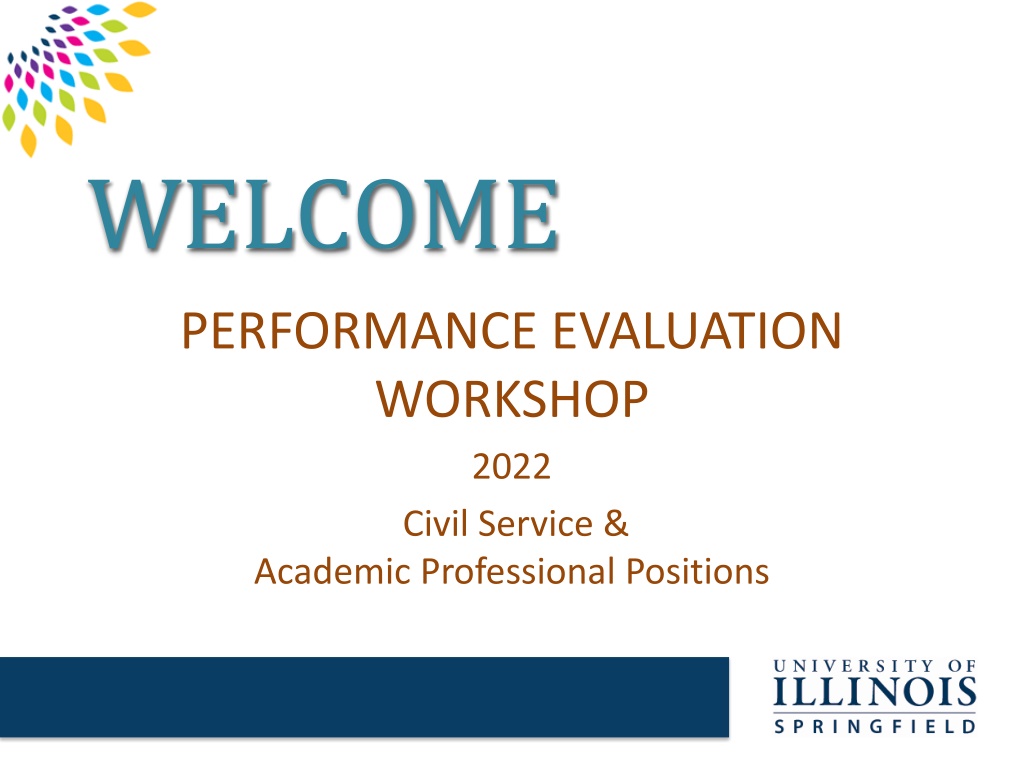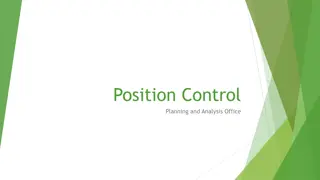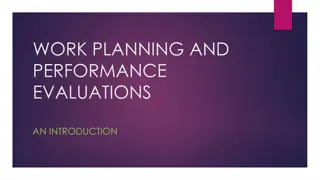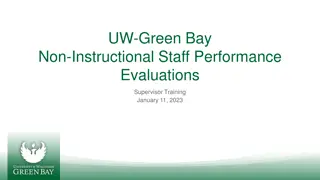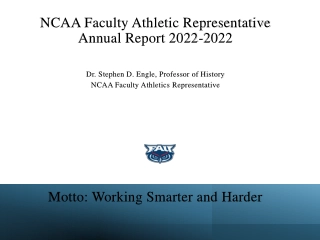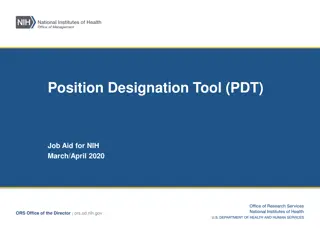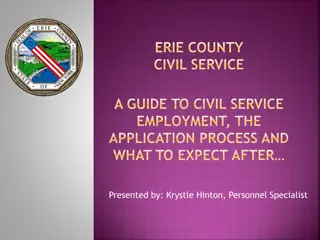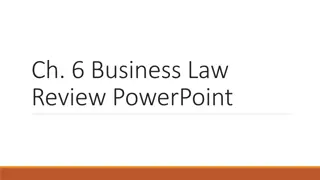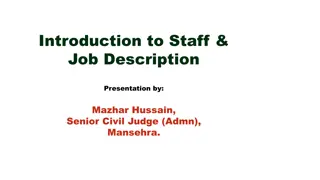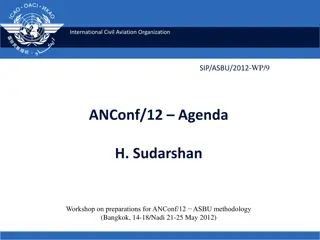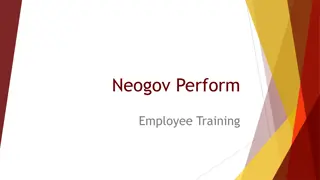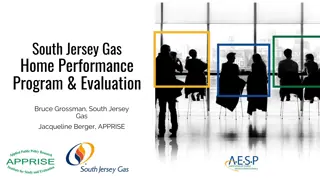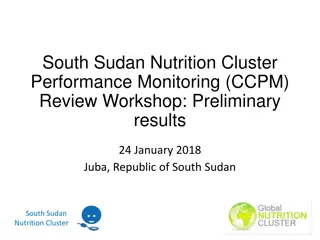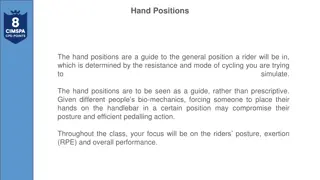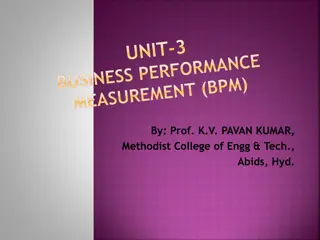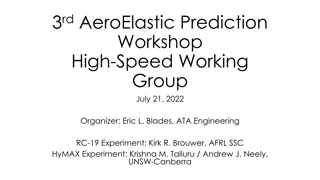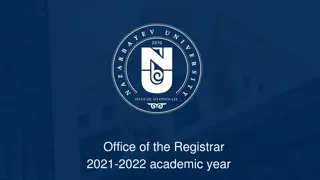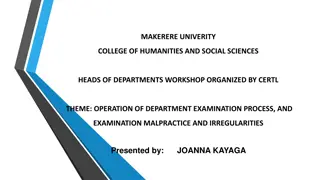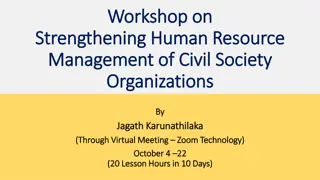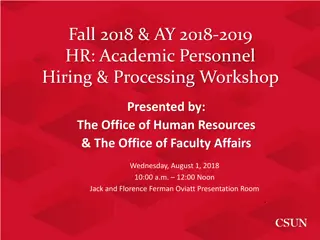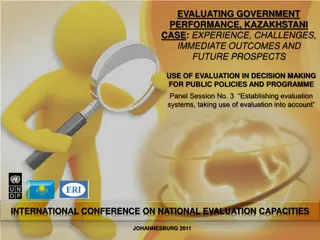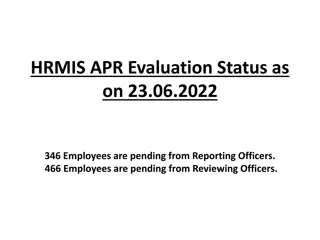Performance Evaluation Workshop 2022 for Civil Service & Academic Positions
This workshop outlines the Performance Evaluation Cycle for the year 2022, detailing the evaluation period, form submission deadlines, and the shift towards digital evaluations. It emphasizes the importance of constructive feedback in evaluations and provides insights into the purpose of evaluations for optimizing performance and fostering employee development. The workshop also cautions against counter-productive comments and discriminatory language in evaluations to maintain professionalism and integrity.
Download Presentation

Please find below an Image/Link to download the presentation.
The content on the website is provided AS IS for your information and personal use only. It may not be sold, licensed, or shared on other websites without obtaining consent from the author. Download presentation by click this link. If you encounter any issues during the download, it is possible that the publisher has removed the file from their server.
E N D
Presentation Transcript
WELCOME PERFORMANCE EVALUATION WORKSHOP 2022 Civil Service & Academic Professional Positions
Performance Evaluation Workshop 2022 Evaluation Cycle Full evaluation period April 1, 2021 March 31, 2022 Evaluations to be conducted beginning April 1, 2022 Performance Evaluations forms due in Human Resources by June 3, 2022.
Were Going Digital! https://www.uis.edu/humanresources/evaluations/ Official Annual Evaluation and filling out the form. The form will then route to the employee for review and signature. It then routes back to the supervisor for approval and then to the Dean/Director for approval. Division Head approval is optional. Please consult with your Division Head to determine whether such approval is needed. Once all approvals are complete, the employee and all approvers will receive an electronic copy via email. Please review this email to make sure that the content of the evaluation is correct. An electronic copy will also be automatically routed to Human Resources to be placed in the employee s personnel file. The form will be initiated by the supervisor by clicking on the electronic form, choosing
These quotes were reportedly taken from actual federal employee performance evaluations: A room temperature I.Q. If he were any more stupid, he'd have to be watered twice a week. His men would follow him anywhere, but only out of morbid curiosity. Got a full six-pack, but lacks the plastic thingy to hold it all together. Works well when under constant supervision and cornered like a rat in a trap. Bright as Alaska in December. When she opens her mouth, it seems that it is only to change feet. He would be out of his depth in a parking lot puddle. This young lady has delusions of adequacy. Takes him 1 hours to watch 60 minutes. This employee should go far --- and the sooner he starts, the better.
Avoid these types of counter-productive statements! Written comments on the annual evaluation should be constructive. Avoid insults or humor. Never say anything that is or can be construed as discriminatory.
Performance Evaluation Workshop Purpose of Evaluation: Optimize Performance Continuous process Two-way process
Performance Evaluation Workshop Purpose of Evaluation Employee Development Supervisor Framework Feedback Opportunity Reinforce Identify & correct Document performance
Performance Evaluation Workshop Purpose of Evaluation Employee Development (cont.) Employee Job/Performance expectations Coaching Positive Reinforcement
Performance Evaluation Workshop Pre- Provide continuous feedback Finalize evaluation evaluation review by dept. head Establish goals, expectations, and standards Evaluation interview Self Evaluation
Performance Evaluation Workshop Goal setting is completed as part of the annual evaluation process. As you review accomplishments and performance for the previous period, you also set goals with the employee for the coming year. What s a goal? Specific statements that describe result to be achieved SMART Goals Specific Measurable Achievable Results Oriented Time Bound
Performance Evaluation Workshop Examples of Unclear Goals: Continue to work on cross-training manual. Work toward becoming the MS Word expert for your work group. Examples of Clear Goals: Create a new cross-training manual by February 2023. Become work group MS Word expert by attending at least 15 hours of training and provide a mini-training session to co- workers.
Performance Evaluation Workshop Performance Factors
Performance Evaluation Workshop Job Knowledge Demonstrates knowledge and skills necessary to perform the job effectively. Understands the expectations of the job and remains current regarding new developments, technologies, methods, theories, approaches, and processes in area of responsibility. Demonstrates initiative and a desire for improvement; seeks new ways to strengthen knowledge, skills, and abilities of self and others including ongoing professional development and training
Performance Evaluation Workshop Judgment and Decision Making Anticipates and identifies problems; proposes and evaluates alternative solutions. Demonstrates resourcefulness and creativity in solving problems and is open to new or different solutions. Follow up on problems and helps to bring about a resolution.
Performance Evaluation Workshop Reliability and Commitment to the Job Meets the work schedule expectations of the position and provides advance notice for absence. Works efficiently; uses time effectively. Demonstrates flexibility and willingness to assist by taking on difficult or inconvenient responsibilities.
Performance Evaluation Workshop Customer Service Listens to and understands the needs of the service recipient, whether inside or outside the University, and responds to those needs.
Performance Evaluation Workshop Productivity and Quality of Work Delivers accurate and thorough work product in a way that reflects favorably upon the unit and the University. Completes an adequate volume of work and establishes appropriate priorities for fulfilling various job tasks.
Performance Evaluation Workshop Communication Clearly, professionally and effectively conveys ideas and information in written and/or oral form.
Performance Evaluation Workshop Teamwork, Cooperation and Interpersonal Skills Establishes and maintains effective working relationships with others. Responds to requests from others in a helpful manner. Works collaboratively and displays a positive attitude toward others.
Performance Evaluation Workshop Diversity, Inclusion, and Creating Community Encourages diversity and inclusion in the workplace; engages in practices to foster a more inclusive working environment; actively engages in work to improve the University as a welcoming community; displays an open and inclusive attitude towards the campus community.
Performance Evaluation Workshop Supervision and Leadership For supervisory staff: Provides effective leadership for subordinates and/or team, clearly communicates expectations, actively addresses and resolves problem; provides mentoring and guidance; provides constructive feedback to subordinates including the timely and accurate completion of annual and probationary evaluations. For non-supervisory staff: Sets a positive example for the campus community. Employee s actions reflect well on the unit and the university.
Performance Evaluation Workshop Strategic Compass Values [Student-focused Teaching and Learning; Integrity; Inquiry; Civic Engagement; Diversity; Strategic Thinking; and Accountability] Employee understands and acts in ways to advance the Strategic Compass values in his/her work and has contributed to the unit s overall progress toward its Strategic Compass goals.
Performance Evaluation Workshop Performance measures: Exceeds Expectations (4) Meets Expectations (3) Developing (2) Needs Improvement (1) Unacceptable (0)
Performance Evaluation Workshop Preparing for Evaluations - Information Gathering Notes from ongoing meetings, assignments, observations, list of accomplishments, and reflections during the year Job Description Individual s Resume Previous Performance Evaluations and projects, goals Feedback from students/customers/co-workers/others Letters of appreciation, planning meetings, performance discussions, professional development programs attended
Performance Evaluation Workshop Evaluation interview: Notify in advance Appropriate location and amount of time Employee Self Evaluation Review Self Evaluation prior to meeting Review Employee Performance Factors prior to meeting Discuss performance with your supervisor prior to meeting
Performance Evaluation Workshop Evaluation interview (cont.) Discuss achievements, performance, and areas for improvement Review and discuss previous goals LISTEN, LISTEN, LISTEN Focus on job performance rather than non-job related factors Be specific with praise and criticism Not primarily for discipline or reprimand No surprises Develop goals for new year
Performance Evaluation Workshop Evaluation obstacles: Halo/horn effect employee s extreme competence in one area shines over others. Conversely, employee does poorly in one area and this overshadows all areas. Leniency/severity supervisor is viewed as being too hard (severity) or too easy (leniency.) Central tendency supervisor tends to rate everyone as a average. Just Like Me being more favorable to people who are like you. Recency Effect focusing on recent performance instead of entire year. Inflated rating when supervisors use satisfactory as their lowest rating.
Performance Evaluation Workshop Next Steps in the Performance Management Process: Yes, It s a Process o Managing people means involvement in individual s work performance and professional development o Document and Communicate your observations with the employee don t wait for the performance appraisal! - Feedback on improvement areas and goals - Department needs and expectations - Professional Development opportunities - Recognition of progress and contributions -Annual Evaluations should not be used for disciplinary purposes
Performance Evaluation Workshop Conclusion Performance Evaluation is a collaborative process. The goal is to provide specific feedback (good & bad) on job performance with the ultimate aim of IMPROVING PERFORMANCE and connecting individual performance to the University s mission, vision, values and strategic initiatives.
Other Things to Know The Annual Performance Evaluation cycle is a great time to review employee responsibilities and ensure the accuracy of all employee job descriptions. Official copies of job descriptions are required for all employees at UIS bi-annually. For 2022, updated job descriptions will be submitted through JDXpert, a new software program for the collection and maintenance of job descriptions, which will go live on June 13th. More information on JDXpert will be sent to supervisors when available. Until then, please create a draft of any necessary changes to job duties and review with the employee during the annual evaluation process.
Job Description Review Basics Job descriptions need to have percentages that are no less than 5% and no greater than 30% and adds up to 100%. Appropriate signatures. Correct job numbers (found in HRFE using employee s name) Current job description formats are on the web. If you have changes or questions, call HR!
Questions? Thanks For Attending! Melissa Mlynski: mmlyn2@uis.edu Kenzie Westlake: mwest22@uis.edu Melisa Hatch: mhat2@uis.edu
